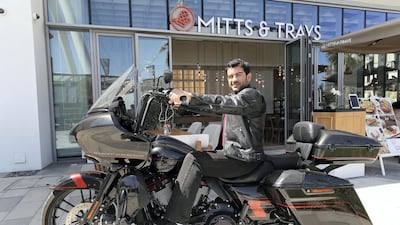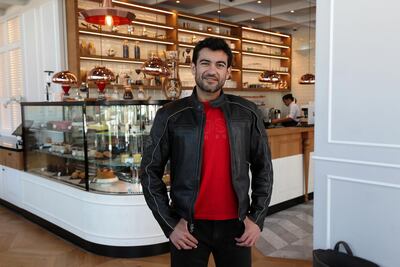Emirati Yousuf Alrustamani worked for Dubai Customs and the Roads and Transport Authority before deciding to try his hand in the private sector. He started as a franchisee for London Fish & Chips, opening his first restaurant in Dragon Mart. After a failure he calls “a learning experience,” Mr Alrustamani, 35, transformed his wife Amna Al Hashemi’s home-based baking business Mitts & Trays into two restaurants; Mitts & Trays City Walk opened in 2016, followed by a second location at Bluewaters Island last year. The couple has four children, aged 4 months old, 4 years, 6 years and 8 years. Mr Alrustamani is also an avid marathon runner and a member of two UAE Harley-Davidson clubs.
How did your upbringing shape your attitude towards money?
I was born in Bur Dubai in 1983. In 1984, we moved to Jumeirah 2 and it was totally a desert area, nothing there — just our house and that’s it. During the 1980s and 1990s, I witnessed the development in Dubai. My father was an architect. He established one of the earliest architecture firms in the private sector. He was involved in a lot of construction projects with the government. He was part of the success story of the emirate of Dubai. So when I started my business, I recalled his story. I wanted to be a part of the success of the new projects in Dubai. My uncles started Al Rostamani Group years before (founded in 1957). I remember my uncle talking to us before he passed away. He kept reminding us that he started as a small worker with Al Owais Enterprises and his salary was 12 Indian rupees (Dh0.63). He started from there and ended up with a big empire.
The way [my parents] raised me is that money is not the core of the business. I use money as a tool, as a resource for the business. But the core of the business is customer satisfaction. In the triangle of cost, quality and time, the most important thing is the quality of the service you’re providing.
How did that influence how you spend money?
I balance my spending. I reinvest a certain percentage of the profits in other projects for the future. Also, a specific percentage goes to charity — zakat and a little bit more than zakat — because we believe that this is the real investment and the more you spend on such noble cases, God will give you more. I also spend on myself and my family, but I don’t want to be greedy, so it’s all about balance. One of my role models is Yusuff Ali, the founder of Lulu Hypermarket. I respect this guy because he once said he gives a big amount of his revenue — 5 or 10 per cent of his net profit — to charity.
I believe in income redistribution. The system should adapt to make sure that money from the richest goes to the poor for the macroeconomics. If the economy is doing badly, the government should spend money on projects to move the cycle of the economy, so the private sector can pay the salaries of their employees and the employees will reinvest cash into the private sector, and the private sector will fund the government sector. So it’s a big cycle and we have to do our part in this cycle.
How do you decide what charitable causes to support?
I start with employees and families I know directly and I also try to support Emirates Red Crescent and Dar Alber Society. I have many cases of employees who come to Dubai - from Africa, from Asia, from South America - that are struggling financially. I try to help them in some way to make their life easier. I try to listen to them. We have to listen to these stories to understand how they arrived here. They suffered a lot before they reached Dubai. We can’t deal with them as a number. I’m interested to hear their stories to learn, to thank God, to see how blessed we are in Dubai and to respect these people — maybe nobody noticed them, maybe nobody knows about their background. I try to support them financially. But I also try to communicate the message that the harder you work, the more the sales will be, the more the money will be distributed to the employees — that they are a part of that success.
How much were you paid for your first job?
My first job was a business analyst in the VAT programme with Dubai Customs. We built the VAT law and did all the paperwork for the VAT system — the law, the hierarchy, the business unit and the business arm procedures. The programme was put on hold in 2008, and then I moved to the RTA. My salary was Dh12,000.
Would you consider yourself a spender or saver?
I'm a balancer. I don’t spend too much and I don’t save too much. On a monthly basis, a specific cash amount pays the salaries of my employees, shares in the Union Coop, maintenance for the house and goes to my kids — I transfer a specific amount to their savings accounts. Then a specific cash amount goes to myself and my wife.
I have a savings account and a current account; my salary goes in the current account and the profit from the business in the savings account. I don’t want to mix them. Whatever remains in the current account at the end of the month, I move it to the savings account.
What do you spend on your children?
For the kids, I pay for their schools, their after-school activities — horse-riding, swimming. I have to invest in the kids also. We have a personal trainer for swimming who comes to the house three times a week. I’m trying to prevent the kids from using the iPad too much. I want them involved in useful physical activities. In our childhood, we used to play outside — football, swimming, going to the beach, going to the park. But these days you have iPads and iPhones. I’m trying not to ban these tools, but I want to keep them busy.
Do you own property or have any other investments?
I have properties, yes. I don’t like to have a big amount of cash in my account. Either I buy a property or start a new project or buy shares. It’s not right to freeze cash in the account.
Why do you believe that?
Because nobody gets any use of it. Even if you open a business, you create new opportunities for people. You will move the economy. At the end of the day, if you succeed, you will get a revenue from it. And, even if you fail, you will learn from your experience. So it’s not a loss. It’s like renewing the cash. It’s not healthy to just hold cash.
Do you have an emergency savings plan?
Yes, we have a local organisation for Emiratis from Dubai to buy shares of the Union Cooperative. Whenever I have cash, I buy shares in that. It’s like a long-term investment. It’s the safest way to hold cash. It’s one of the most successful businesses in Dubai. We buy shares there and at the end of the year, they distribute cash, as well as a percentage of the shares. For example, if I buy 1,000 shares today, at the end of the year they give me 200 or 300 shares on that 1,000, plus 10 per cent of our expenditure on the corporation.
So this is our strategic safe plan. If I’m bankrupt, if any bad scenarios happen in the market, I have shares I can use in emergencies. The most important thing is the percentage of the shares — usually it’s between 20 to 35 per cent and no one will give you a better investment. It’s one of the safest and highest percentage investments in the whole region.
What do you splurge on?
I travel a lot, maybe eight to 10 times a year, but short trips — I don’t like to stay more than a week in one place. I travel to participate in marathons or motorbike tours, which is a nice way to see the world - and also family visits. I have family in Kuwait and Bahrain. For family vacations, my favourite place for the kids is Europe, specifically Paris because of Disneyland Paris and London because I like to go to the theatre and the shows.
Do you fly economy or business?
I fly business. But it’s because I used to weigh 146 kilograms and I couldn’t sit in an economy seat. Now I'm used to it.
If you won Dh1million, what would you spend it on?
I would give 2.5 per cent to zakat, 2.5 per cent to charity, reinvest 66 per cent and give 10 per cent to myself and my family; the rest is for savings.



